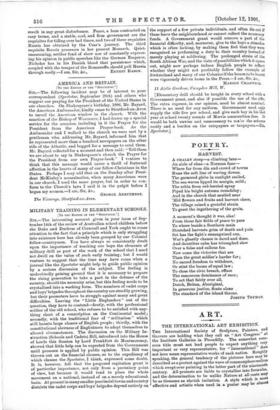MILITARY TRAINING IN ELEMENTARY SCHOOLS. [To THE EDITOR OP THE
" SPECTATOR."] Sin,—The interesting account given in your issue of Sep- tember 14th of the review of Australian school children before she, Duke and Duchess of Cornwall and York ought to rouse attention to the fact that a principle which is only struggling into existence here has already been grasped by our Colonial fellow-countrymen. You have always so consistently dwelt upon the importance of teaching our boys the elements of military drill as part of the work of the school that I need not dwell on the value of such early training; but I would venture to suggest that the time may have come when a journal like the Spectator might help to guide public opinion by a serious discussion of the subject. The feeling is undoubtedly gaining ground that it is necessary to prepare the rising generation to take a part in the defence of the country, should the necessity arise, but this feeling needs to be crystallised into a working form. The numbers of cadet corps and boys' brigades throughout the country are steadily growing, but their promoters have to struggle against many and great difficulties. Leaving the "Little Englanders" out of the question, they have to contend—firstly, with the professional soldier of the old school, who refuses to be satisfied with any- thing short of a conscription on the Continental model ; secondly, with the traditional fear of " militarism" which still haunts large classes of English people; thirdly, with the constitutional slowness of Englishmen to adapt themselves to altered circumstances. The discussion on the Military In- struction (Schools and Cadets) Bill, introduced into the House of Lords this Session by Lord Frankfort de Montmorency, showed that little help can be expected from the Government until pressure is applied by public opinion. This Bill was thrown out on the financial clauses, as to the expediency of which clauses the Spectator, I think, expressed some doubt. It is, however, felt that the proposed capitation grant is of particular importance, not only from a pecuniary point of view, but because it would tend to place the whole movement on a national, instead of on a merely educational, basis. At present in many smaller provincial towns and country districts the cadet corps and boys' brigades depend entirely on the support of a few private individuals, and often die out if these leave the neighbourhood or cannot collect the necessary funds. A Government grant would remove a part of the financial difficulty, and, moreover, give to the boys a stimulus which is often lacking, by making them feel that they were recognised as performing a duty to their country instead of merely playing at soldiering. The prolonged strain of the South African War, and the vista of possibilities which it opens out, might now perhaps induce English people to reflect whether they might not profitably follow the example of Switzerland and many of our Colonies if the lesson to be learnt were vigorously driven home in the Press.—I am, Sir, &c.,
MARION CILLDWICK..
11 Airlie Gardens, Cantpdca Hill, W.
[Elementary drill should be taught in every school with a Government grant, and also if possible the use of the rifle. The extra expense, in our opinion, need be almost nominal. There is no need for any uniform. Government need only supply the rifle five per school, and give each boy in his rist year at school twenty rounds of Morris ammunition free. It would be both unwise and unnecessary to make the scheme costly and a burden on the ratepayers or taxpayers.—En. Spectator.]














































 Previous page
Previous page